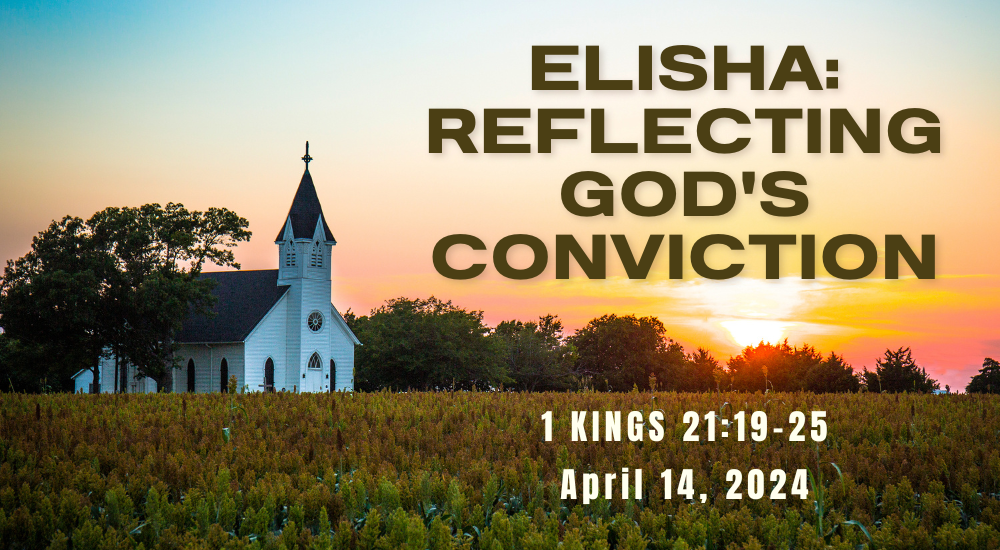
1 Kings 21:19-25 Elisha: Reflecting God’s Conviction
The work of every believer, especially God’s ministers, is to personally and socially hold fast to and insist upon Biblical standards as they apply to all facets of life including origin, meaning, morality and destiny regardless of cultural consensus.
Deuteronomy 7:9-10: “Know that the Lord your God is God, the faithful God who keeps his gracious covenant loyalty for a thousand generations with those who love him and keep his commands. 10 But he directly pays back and destroys those who hate him. He will not hesitate to pay back directly the one who hates him.”
- Grammatical Usage: “pays back” or in the Hebrew, “shalam” meaning, “requite, recompense”; “destroys” or “abad” meaning, “annihilate, obliterate”; “hates” or “sane” meaning, “intensely detests”.
- Literal Interpretation: Know that the Lord your God is God, the faithful God who keeps his gracious covenant loyalty for a thousand generations with those who love him and keep his commands. 10 But he directly recompenses and annihilates those who intensely detest him. He will not hesitate to pay back directly the one who hates him.
- Contextual/Comparison: God keeps His Word, God continually uses His Word. The gentle tone of Elisha’s ministry makes him no less a servant of a just God:
- CONSIDER THE FIRST MIRACLE OF KINDNESS
- The inhabitants of Jericho realigned with God
- In turn, God demonstrates His kindness through His prophet
- Elisha is careful to stipulate, “Thus says the Lord…” ( 21b)
- CONSIDER THE SECOND MIRACLE OF JUSTICE
- REALIZE WHO THESE “YOUTHS” WERE.
- In Genesis 44:20, Benjamin is described as “a young son born to him (Joseph) in his old age” – but Benjamin was at least twenty at that time.
- In 1 Samuel 16:11, David is called “the youngest” of Jesse’s “sons”, and the Hebrew words for “youngest” and “children” are the two words translated “youths” in 2 Kings 2:23. How old was David at this time? In 1 Samuel 16:18 we are told he was “a brave man and a warrior. He speaks well and is a fine looking man…”, which suggests he must have been twenty or thirty years of age.
- In 1 Kings 3:7, Solomon says of himself, “I am only a little child” – again the same two Hebrew words – but Solomon was twenty years old!
- NOTICE WHERE THESE OFFENDERS LIVED.
- They lived in Bethel, where there was a golden calf erected by Jeroboam (1 Kings 12:28-33) – a stronghold of idolatry and a center of apostasy.
- They were representatives of a wicked movement that blasphemed the name of God, and their attack on Elisha was not, therefore, a sudden whim but the expression of a determined attitude.
- NOW OBSERVE EXACTLY WHAT THESE OFFENDERS DID.
- They mocked Elisha, saying, “Go on up, you bald head; go on up, you bald head!” ( 23). Elisha was God’s prophet, and whereas these young men were representatives of their false gods, so the attack against Elisha was an attack against the One, True God, just as when Saul persecuted the early Christians he was really persecuting the Lord Jesus (Acts 9:4).
- But what is the significance of the mocking words? Knowing Elisha to be God’s newly-appointed prophet, the young men met him with the words, “Go on up you bald head!” In the East, this was an expression of abuse – a grave insult. Why did they say, “Go on up…!”? Was it because they knew Elijah had just gone up, and in effect they were now saying to his successor, “You go up too, where you belong!”? They were speaking against Elisha in the same way that some ungodly people today speak against the Lord’s servants – attempting to cancel their ministry…and life if they could.
- NOW CONSIDER ELISHA’S ACTION.
- SEE HOW GOD’S JUDGMENT FELL UPON THESE MOCKERS.
- NOTICE LESSONS TO BE LEARNED FROM THIS INCIDENT
- We must guard against having a distorted, one-sided view of God – look up Mark 16:16; Romans 6:23; 11:22.
- God cannot be defied with impunity, whether by old or young – look up Proverbs 29:1; Galatians 6:7-8.
- It is very dangerous to persecute God’s people – look up Psalm 105:15; Zechariah 2:8.
- Parents must suffer if they neglect or poison their children. These “children” had been trained in idolatry; now they and their parents were suffering in consequence.
- Difficult as this subject is, let us remember that the Judge of all the earth always does that which is right – look up Deuteronomy 32:3-4.
The “youths” who mocked Elisha were between sixteen and thirty years of age; they were of a responsible age of accountability; old enough to know what they were doing – engaging in an attack upon the Lord’s anointed.
Referencing v. 24, was he wrong? Did he act hastily? The proof that it was not wrong is the fact that God endorsed what he did by sending swift and terrible judgment upon these enemies of His name.
We are not told that forty-two were killed, though many would carry a scar to the end of their days. Severe judgment? See 2 Chronicles 36:16.
- Conclusion: Do we understand how our actions and reactions look to God and others?
